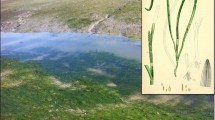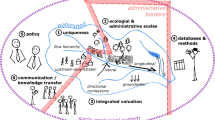Abstract
Effective management of ecosystems, natural resources, and harvesting practices is essential for ecosystem health and the sustainable use of marine resources. Although the value, importance, and benefits of the incorporation of indigenous knowledge, particularly of traditional ecological knowledge into western science-policy decision-making have been well recognized over the past few decades, suitable mechanisms for collecting and incorporating indigenous knowledge into policy level decision making are not yet well understood. This study examines the Canadian government’s assessment process for the American eel, Anguilla rostrata, as well as the community level management process for the eel fishery in Eskasoni First Nation, Cape Breton, Nova Scotia, Canada. This case study allows for an exploration of the challenges arising from differing worldviews and possible mechanisms for meaningful integration of indigenous values into governmental policy level decision-making.








Similar content being viewed by others
Notes
The Department of Fisheries and Oceans manages the eel fishery in two groups, the adult eel fishery and the elver fishery, which is directed at eels under 10cm in length (Chaput et al. 2014).
There are different dishes for different sizes of eels, so whatever eelers catch they are able to use. Large eels are baked, and smaller eels are used in soup or stew.
References
Barnhardt, R. (2005). Indigenous Knowledge Systems and Alaska Native Ways of Knowing. Anthropology & Education Quarterly 36(1): 8–23.
Battiste, M. (2005). Indigenous Knowledge: Foundations for First Nations. World Indigenous Nations Higher Education Consortium-WINHEC Journal.
Battiste, M. (2011). Reclaiming Indigenous Voice and Vision. UBC Press.
Berkes, F. (2006). From Community-Based Resource Management to Complex Systems: The Scale Issue and Marine Commons. Ecology and Society 11(1): 45–64.
Berkes, F., and Henley, T. (1997). Co-Management and Traditional Knowledge: Threat or Opportunity? Policy Opinions Montreal 18(1): 29–30.
Berkes, F., Armitage, D. R., and Doubleday, N. (2007). Adaptive co-management: Collaboration, learning, and multi-level governance. UBC Press.
Berkes, F., Colding, J., and Folke, C. (2000). Rediscovery of Traditional Ecological Knowledge as Adaptive Management. Ecological Applications 10(5): 1251–1262.
Beswick, A. (2013). Eskasoni Educators Fight to Save Mi’kmaq Language. Retrieved 5/12, 2015 from http://thechronicleherald.ca/novascotia/1160998-eskasoni-educators-fight-to-save-mi’kmaq-language.
Canada. (2014). Aboriginal fund for species at risk. Online: https://www.retablissement-recovery.gc.ca/afsar-faep/index.cfm?fuseaction=home.main&lang=E.
Cargo, M., and Mercer, S. L. (2008). The Value and Challenges of Participatory Research: Strengthening its Practice. Annual Review of Public Health. (29) 325–350.
Carm, E. (2014). Inclusion of Indigenous Knowledge System (IKS)—A Precondition for Sustainable Development and an Integral Part of Environmental Studies. The Journal of Educational Research 4(1): 58–76.
Castleden, H., Garvin, T., and First Nation, H. (2008). Modifying Photo Voice for Community-Based Participatory Indigenous Research. Social Science & Medicine 66(6): 1393–1405 doi:10.1016/j.socscimed.2007.11.030.
Chapin, F. I., Folke, C., and Kofinas, G. P. (2009). Principles of Ecosystem Stewardship. Resilience-Based Natural Resource Management in a Changing World. In A Framework for Understanding Change. Springer, New York, pp. 2–38.
Chaput, G., Cass, A., Grant, S., Huang, A.M., and Veinott, G. (2012). Considerations for Defining Reference Points for Semelparous Species, with Emphasis on Anadromous Salmonid Species Including Iteroparous Salmonids. ( No. 2012/146. v + 48 p.). DFO Canadian Science Advisory Section.
Chaput, G., Cairns, D. K., Bastien-Daigle, S., LeBlanc, C., Robichaud, L., Turple, J.,and Girard, C. (2014). Recovery Potential Assessment for the American eel (Anguilla rostrata) for Eastern Canada: Mitigation Options. No. 2013/133. v + 30 p.). DFO Canadian Science Advisory Section Research Documentation.
Cochran, P. A., Marshall, C. A., Garcia-Downing, C., Kendall, E., Cook, D., McCubbin, L., and Gover, R. M. (2008). Indigenous Ways of Knowing: Implications for Participatory Research and Community. American Journal of Public Health 98(1): 22–27 doi:10.2105/AJPH.2006.093641.
Corntassel, J. (2012). Re-Envisioning Resurgence: Indigenous Pathways to Decolonization and Sustainable Self-Determination. Decolonization: Indigeneity, Education & Society 1(1): 86–101.
COSEWIC. (2011a). Canadian Wildlife Species at Risk. Accessed December 2014, http://www.cosewic.gc.ca/eng/sct0/rpt/rpt_csar_e.pdf.
COSEWIC (2011b). American eel. Accessed November 2014, http://www.cosewic.gc.ca/eng/sct1/searchdetail_e.cfm?id=891&StartRow=1&boxStatus=All&boxTaxonomic=3&location=All&change=All&board=All&commonName=American%20Eel&scienceName=&returnFlag=0&Page=1.
COSEWIC. (2014). COSEWIC Composition. Accessed November 2014, http://www.cosewic.gc.ca/eng/sct6/sct6_4_e.cfm#3
Davis, A., Wagner, J., Prosper, K., and Paulette, M. J. (2004). The Paq’tnkek Mi’kmaq and ka’t (American eel): A Case Study of Cultural Relations, Meanings, and Prospects. The Canadian Journal of Native Studies 24(2): 359–390.
Denny, S., and Paul, T. (2012). Mi’kmaq Fisheries of Unama’ki. UNIR, Eskasoni Nova Scotia.
DFO. (2010). Integrated Fisheries Management Plans. Retrieved 11/30/2014, from http://www.dfo-mpo.gc.ca/fm-gp/peches-fisheries/ifmp-gmp/index-eng.htm.
DFO. (2013). Mission, Vision, and Values. Accessed January 2014, http://www.dfo-mpo.gc.ca/about-notre-sujet/org/vision-eng.htm.
DFO. (2014). Listing Process for Aquatic Species not on Schedule I of the Species at Risk Act (SARA). Accessed November 2014, from http://www.dfo-mpo.gc.ca/species-especes/policy-politique-eng.htm#8.
Ens, E. J., Finlayson, M., Preuss, K., Jackson, S., and Holcombe, S. (2012). Australian Approaches for Managing ‘Country’Using Indigenous and Non‐Indigenous Knowledge. Ecological Management & Restoration 13(1): 100–107.
Eskasoni. (2014a). Community Report 2012–2014.Eskasoni. Online: http://www.eskasoni.ca/uploads/newsletter/COMMUNITY-REPORT-2012–2014-(web).pdf.
Eskasoni. (2014b). Our Eskasoni. Accessed November 2014, http://www.eskasoni.ca/History/.
FishWIKS. (2013). Eskasoni. Accessed November 2014, http://fishwiks.ca/communities/eskasoni-ns/.
Gratani, M., Butler, J. R., Royee, F., Valentine, P., Burrows, D., Canendo, W. I., and Anderson, A. S. (2011). Is validation of Indigenous Ecological Knowledge a Disrespectful Process? A Case Study of Traditional Fishing Poisons and Invasive Fish Management from the Wet Tropics. Australia. Ecology and Society 16(1): 1–14.
Hassan, S. A., and Hanapi, M. S. (2013). “Scientificity” of Social Research: Its Challenges and Implications. Academic Journal of Interdisciplinary Studies 2(9): 62–73.
Houde, N. (2007). The Six Faces of Traditional Ecological Knowledge: Challenges and Opportunities for Canadian Co-Management Arrangements. Ecology and Society 12(2): 34–45.
Hurlbert, S. H. (1984). Pseudoreplication and the Design of Ecological Field Experiments. Ecological Monographs 54(2): 187–211.
Jessop, B. M. (2006). Underwater World: American Eel. Department of Fisheries and Oceans Canada. Online: http://www.dfo-mpo.gc.ca/Science/publications/uww-msm/pdf/eel-anguille-eng.pdf.
Kuhn, T. S. (2012). The Structure of Scientific Revolutions. University of Chicago Press, Chicago.
Longino, H. E. (1990). Introduction: Good Science, Bad Science. Science as Social Knowledge: Values and Objectivity in Scientific Inquiry. Science as Social Knowledge: Values and Objectivity in Scientific Inquiry. Princeton University Press, Princeton, pp. 3–15.
Marshall, A. (2004). Two-Eyed Seeing. Institute for Integrative Science and Health. Online: http://www.integrativescience.ca/Principles/TwoEyedSeeing/.
Miller, M., and Casselman, J. (2014). The American eel: a fish of mystery and sustenance for humans. In Tsukamoto, K., and Kuroki, M. (eds.), Eels and Humans. Springer Press, pp. 155-169.
NACOSAR. (2014). FAQs. Accessed December 2014, http://www.nacosar-canep.ca/en/faqs/.
R. v. Marshall. (1999). SCR 3, 1999 (19991), 456.
Reo, N. J. (2011). The Importance of Belief Systems in Traditional Ecological Knowledge Initiatives. The International Indigenous Policy Journal 2(4): 8.
Reo, N. J., and Whyte, K. P. (2012). Hunting and Morality as Elements of Traditional Ecological Knowledge. Human Ecology 40(1): 15–27 doi:10.1007/s10745-011-9448-1.
Ryan, T. (2012). Indigenous Knowledge Systems: An Overview. Online: http://citeseerx.ist.psu.edu/viewdoc/download;jsessionid=829E14E5034AD19B411D4EF6D38790B4?doi=10.1.1.296.5045&rep=rep1&type=pdf.
SARA. (2008). Species at Risk: Annual Report 2008. Online: https://www.registrelep-sararegistry.gc.ca/virtual_sara/files/reports/sar_2008_0310_e.pdf.
SARA. (2014a). Response Statement—American Eel. Accessed December 2014, http://www.sararegistry.gc.ca/document/dspHTML_e.cfm?ocid=9474.
SARA. (2014b). SARA General Status Reports. Accessed November 2014, http://www.sararegistry.gc.ca/document/dspHTML_e.cfm?ocid=7382#General_Status.
Schuegraf, and Dowd. (2007). Ta’n Telnenas’gl Ga’te’gati’l Gespe’gewa’gig Perceptions of American Eel Habitat In Gespe’gewa’gi. Online: http://www.migmaqresource.org/sites/default/files/temp/GMRC_Eel-Ga%2527t_report_e.pdf.
Simpson, L. R. (2004). Anticolonial Strategies for the Recovery and Maintenance of Indigenous Knowledge. American Indian Quarterly 28(3): 373–384.
Simpson, L. B. (2014). Land as Pedagogy: Nishnaabeg Intelligence and Rebellious Transformation. Decolonization: Indigeneity, Education & Society 3(3): 1–25.
Smith, L. T. (1999). Decolonizing Methodologies: Research and Indigenous Peoples. Zed Books.
Sparrow v. the Queen. (1990). SCR 1, 1990(19901), 1075.
Tellis, W. (1997). Application of a Case Study Methodology. The Qualitative Report 3(3): 1–17.
Turnbull, D. (2009). Futures for Indigenous Knowledges. Futures 41(1): 1–5 doi:10.1016/j.futures.2008.07.002.
UINR. (2013). Unama'ki Institute of Natural Resources. Accessed November 2014, from http://www.uinr.ca.
UINR (Producer), and UINR (Director). (2009). Netukulimk. Online: https://www.youtube.com/watch?v=wsNVewjgKxI.
Usher, P. J. (2000). Traditional Ecological Environmental Assessment and Management. Arctic 53(2): 183.
Weiler, M. H. (2011). Mi’kmaq and the American eel. Traditional knowledge relating to the American eel by mainland Nova Scotia Mi’kmaq #1734. Accessed September 2014, http://mikmaki.ca/PDFs/Weiler_Mikmaq_and_the_American_Eel.pdf
Weiss, K., Hamann, M., and Marsh, H. (2013). Bridging Knowledges: Understanding and Applying Indigenous and Western Scientific Knowledge for Marine Wildlife Management. Society & Natural Resources 26(3): 285–302 doi:10.1080/08941920.2012.690065.
Whyte, K. P. (2013). On the Role of Traditional Ecological Knowledge as a Collaborative Concept: A Philosophical Study. Ecological Processes 2013: 7(2) doi:10.1186/2192-1709-2-7.
Wicken, W. (2002). Mi'kmaq Treaties on Trial: History, Land, and Donald Marshall Junior. University of Toronto Press, Toronto.
Wildcat, M., McDonald, M., Irlbacher-Fox, S. and Coulthard, G. (2014). Learning from the Land: Indigenous Land Based Pedagogy and Decolonization. Decolonization: Indigeneity, Education & Society. 3(3): I-XV
Wildsmith, B. H. (1995). Mi'kmaq and the fishery: Beyond food requirements, the. Dalhousie LJ, 18, 116.
Wilson, S. (2008). Research is Ceremony: Indigenous Research Methods. Fernwood Publishing, Winnipeg.
Yin, R. K. (2013). Case Study Research: Design and Methods. Sage publications.
Acknowledgments
The authors would like to acknowledge with thanks the willingness of all participants who agreed to share their knowledge for this study and the anonymous reviewers for their valuable suggestions.
Author information
Authors and Affiliations
Corresponding author
Ethics declarations
Research involving human participants: This study is based on research involving human participants and has obtained Ethics Approval from Dalhousie University Research Ethics Board as well as Ethics Approval from the Mi’kmaq Ethics Watch.
Informed Consent
All participants in this research have provided the authors with signed letters of Informed Consent.
Funding
This study was funded by the Social Sciences and Humanities Research Council (SSHRC) Partnership Grant #895-2011-1007.
Conflict of Interest
The authors declare that they have no conflict of interest.
Rights and permissions
About this article
Cite this article
Giles, A., Fanning, L., Denny, S. et al. Improving the American Eel Fishery Through the Incorporation of Indigenous Knowledge into Policy Level Decision Making in Canada. Hum Ecol 44, 167–183 (2016). https://doi.org/10.1007/s10745-016-9814-0
Published:
Issue Date:
DOI: https://doi.org/10.1007/s10745-016-9814-0




